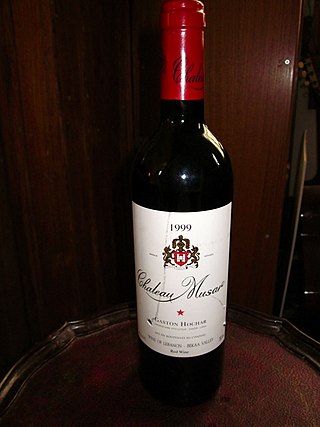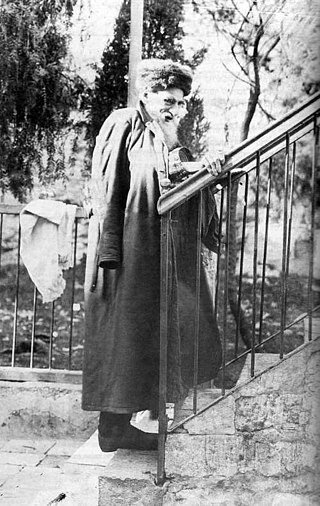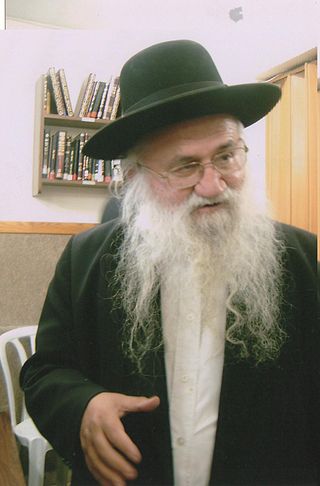Related Research Articles

The Musar movement is a Jewish ethical, educational and cultural movement that developed in 19th century Lithuania, particularly among Orthodox Lithuanian Jews. The Hebrew term Musar (מוּסַר), is adopted from the Book of Proverbs (1:2) describing moral conduct, instruction or discipline, educating oneself on how one should act in an appropriate manner. The term was used by the Musar movement to convey the teachings regarding ethical and spiritual paths. The Musar movement made significant contributions to Musar literature and Jewish ethics. The movement has been revived in the 21st century amongst Jews of all denominations, particularly in the United States.

Jewish ethics is the ethics of the Jewish religion or the Jewish people. A type of normative ethics, Jewish ethics may involve issues in Jewish law as well as non-legal issues, and may involve the convergence of Judaism and the Western philosophical tradition of ethics.
Yisrael ben Ze'ev Wolf Lipkin, also known as "Israel Salanter" or "Yisroel Salanter", was the father of the Musar movement in Orthodox Judaism and a famed Rosh yeshiva and Talmudist. The epithet Salanter was added to his name since most of his schooling took place in Salant, where he came under the influence of Rabbi Yosef Zundel of Salant. He was the father of mathematician Yom Tov Lipman Lipkin.

Chateau Musar is the name of a Lebanese winery in Ghazir, Lebanon, 24 kilometres (15 mi) north of the capital Beirut. Musar grapes grow in the Beqaa Valley, a fertile sunny valley at an elevation of 1,000 metres (3,300 ft), situated 40 km (25 mi) east of Beirut.

At a national level, Slovenia elects a head of state and a legislature. The president is elected for a five-year term by the people using the run-off system. The National Assembly, Slovenia's parliament, has 90 members each elected for four-year terms. All but two of these are elected using the D'Hondt method of list proportional representation. The remaining two members are elected by the Italian and Hungarian ethnic minorities using the Borda count.
Musar may refer to

Eliezer Gordon also known as Reb Laizer Telzer, served as the rabbi and rosh yeshiva of Telz, Lithuania.
Simcha Zissel Ziv Broida, also known as Simhah Zissel Ziv or the Alter of Kelm, was one of the foremost students of Yisrael Salanter and one of the early leaders of the Musar movement. He is best known as the founder and director of the Kelm Talmud Torah.
The Kelm Talmud Torah was a famous yeshiva in pre-holocaust Kelmė, Lithuania. Unlike other yeshivas, the Talmud Torah focused primarily on the study of Musar and self-improvement.

Lebanon is among the oldest sites of wine production in the world. The Israelite prophet Hosea is said to have urged his followers to return to God so that "they will blossom as the vine and fame be like the wine of Lebanon, [and] their fragrance will be like that of Lebanon". The Phoenicians of the coastal strip were instrumental in spreading wine and viticulture throughout the Mediterranean in ancient times. Despite the many conflicts of the region, the country has an annual production of about 8,500,000 bottles of wine.
The Northern Adelbert or Pihom–Isumrud languages are a family of two dozen languages in the Madang stock of New Guinea. The occupy the coastal northern Adelbert Range of mountains, vs. the Southern Adelbert languages, another branch of Madang.
Rabbi Ira F. Stone is a leading figure in the contemporary renewal of the Musar movement, a Jewish ethical movement.
Musar literature is didactic Jewish ethical literature which describes virtues and vices and the path towards character improvement. This literature gives the name to the Musar movement, in 19th century Lithuania, but this article considers such literature more broadly.

Yitzchak Blazer (1837–1907) was an early important leader of the Musar movement.
Alan Morinis is a Canadian anthropologist, filmmaker, and writer who has been a leading figure in the contemporary revival of the Musar movement, a Jewish ethical movement.
Zechariah (Yaḥya) al-Ḍāhirī, often spelled Zechariah al-Dhahiri, was the son of Saʻīd (Saʻadia) al-Ḍāhirī, from Kawkaban, in the District of al-Mahwit, Yemen, a place north-west of Sana’a. He is recognized as one of the most gifted Yemenite Jewish poets and rabbinic scholars who left Yemen in search of a better livelihood, travelling to Calicut and Cochin in India, Hormuz in Persia, Basra and Irbīl in Babylonia, Bursa and Istanbul in Anatolia, Rome in Italy, Aleppo and Damascus in Syria, Safed and Tiberias, as well as Jerusalem and Hebron in the Land of Israel, Sidon in Ottoman Lebanon and Egypt, and finally unto Abyssinia where he returned to Yemen by crossing the Erythraean Sea and alighting at a port city near Mocha, Yemen. He wrote extensively about his travels and experiences in these places, which he penned in a Hebrew rhymed prose narrative, and eventually publishing them in a book which he called Sefer HaMusar, in circa 1580.

Dov Yaffe (Hebrew: דב יפה; 1928–2017) was a Polish-born Israeli rabbi, mashgiach, and leader of the Musar movement.
Geoffrey Claussen is an American rabbi and scholar who serves as a professor of Religious Studies at Elon University. His scholarship focuses on Jewish ethics, theology, and the Musar movement.

Presidential elections were held in Slovenia on 23 October 2022. Since no candidate received a majority of the vote, a run-off between the top two placing candidates, Slovenian Democratic Party candidate Anže Logar and independent candidate Nataša Pirc Musar, took place on 13 November 2022. Incumbent President Borut Pahor was ineligible to run for a third consecutive term due to term limits. Pirc Musar won the run-off with 53.86% of the vote, becoming the first female president of Slovenia.

Nataša Pirc Musar is a Slovenian attorney and author, former Information Commissioner (2004–2014), journalist and former president of the Slovenian Red Cross (2015–2016). She is best known for her rulings and books on freedom of information, legal opinion, and high-profile legal cases, in which she represented Slovenia-born Melania Trump, the Social Democrats political party of Slovenia, and other notable clients. In the second round of the presidential elections in November 2022, she was elected the first female president of Slovenia.
References
- ↑ Musar at Ethnologue (25th ed., 2022)
